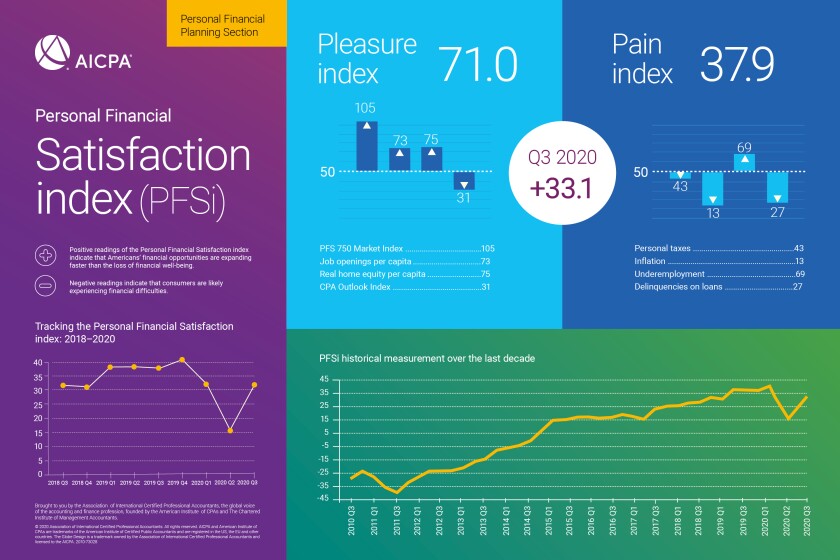Financial satisfaction of people in the U.S. rebounded strongly in the third quarter of the year, according to a new survey by the American Institute of CPAs, reversing the lows in the second quarter in the midst of the recession brought on by the novel coronavirus pandemic.
The AICPA’s Q3 2020 Personal Financial Satisfaction Index measured 33.1, representing a whopping 99 percent (16.5 point) increase from the previous quarter. That’s the biggest quarterly increase in the 27-year history of the PFSi, and a complete turnaround from the second quarter, when the index had its largest ever quarterly drop.
Michelle Bonat is the chief AI officer at AI Squared, with a history of leadership roles in AI and technology, including AI CTO at JPMorgan Chase and head of AI Innovation at Chase. She led global engineering and product initiatives at Oracle across 30 countries and founded a fintech startup. A patent holder and hands-on data scientist always experimenting with the next new innovation, Michelle also drove product leadership at three companies that were acquired including Ariba (acquired by SAP).
Rathi Murthy is the Chief Technology Officer at Varo Bank, the first nationally chartered all-digital consumer bank in the United States. In this role, she leads the company's end-to-end technology strategy, overseeing the design and development of secure, scalable, and AI-powered digital banking platforms. Her leadership is instrumental in advancing Varo's mission to build inclusive, accessible, and real-time financial solutions for millions of consumers.
A seasoned technology executive, Rathi brings over 25 years of experience leading innovation and digital transformation at some of the world's most recognized technology and financial services companies. Prior to joining Varo, she served as Chief Technology Officer and President of Expedia Product & Technology at Expedia Group, where she modernized the company's global travel infrastructure, integrating AI-driven personalization, modular architecture, and advanced cloud capabilities across its family of brands.
Earlier, she held executive leadership roles at Verizon Media and Gap Inc., where she led enterprise cloud migrations, e-commerce platform evolution, and large-scale product delivery initiatives across global markets.
Rathi also served as Senior Vice President and Chief Information Officer of Enterprise Growth at American Express, where she was responsible for the technology strategy and operations of the Serve platform and a suite of prepaid products including Bluebird.
Rathi's early career includes engineering leadership roles at eBay, Yahoo!, Sun Microsystems, and WebMD, where she consistently delivered improvements in platform stability, operational agility, and customer experience.
In addition to her executive work, Murthy is a board member at PagerDuty, Inc., a leader in digital operations management, and serves as an External Expert Advisor to the University of San Francisco's Board of Trustees Committee on Information Technology Strategy. She is also a regular speaker at industry events and leadership forums, offering thought leadership on topics such as fintech innovation, integrating AI, platform transformation, and executive technology leadership.
The PFSi is built around various factors, including the labor market. The gains can be mainly attributed to improvements in job openings per capita and underemployment. Those had the biggest impact on increasing the overall PFSi. The biggest factor driving the quarter-over-quarter rally was a 35 percent (37 point) decrease in underemployment. A decrease in underemployment improves overall financial satisfaction in the index. While there was an improvement in underemployment in the third quarter from Q2’s record high, it’s still 117 percent above its level a year ago. For the second consecutive quarter, underemployment is still the biggest negative contributor to the average American’s personal financial satisfaction. The Q3 underemployment level reflects data measured through the middle of September.
“As Americans continue to navigate the economic impact of the COVID-19 pandemic, it is important to remember that the fundamentals of financial planning haven’t changed,” said AICPA PFS Credential Committee chair Dave Stolz in a statement Thursday. “Though the stock market’s record performance is encouraging, 2020 has served as a reminder of the volatile nature of markets. As the impact of COVID-19 continues to play out across the country, investors should weigh their risk tolerance and ensure they have ample cash on hand. Further, a tax-efficient financial plan that includes a diversified portfolio can give confidence that long-term financial goals will remain within reach through this period of extreme uncertainty.”
The coronavirus put millions out of work, prompting job openings per capita to show a record plummet earlier this year. In the third quarter, job openings started to recover, climbing 37 percent (20 points) compared to Q2. That factor is now only 10 percent below its measurement a year ago before the pandemic. The Q3 index comes from July data from the U.S. Bureau of Labor Statistics.




